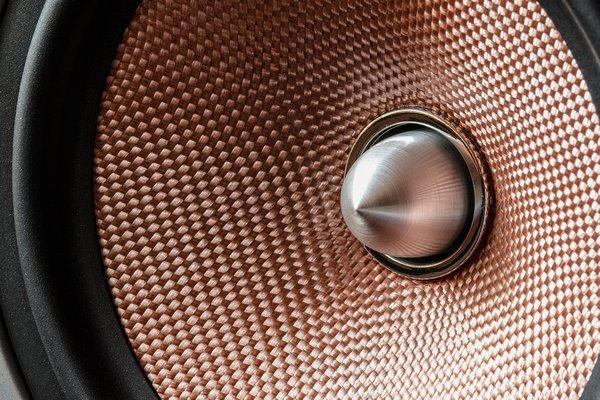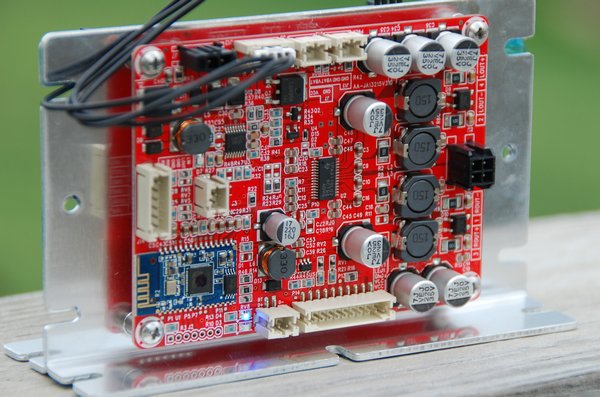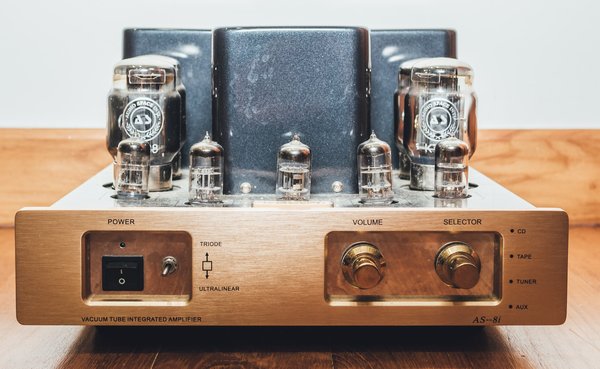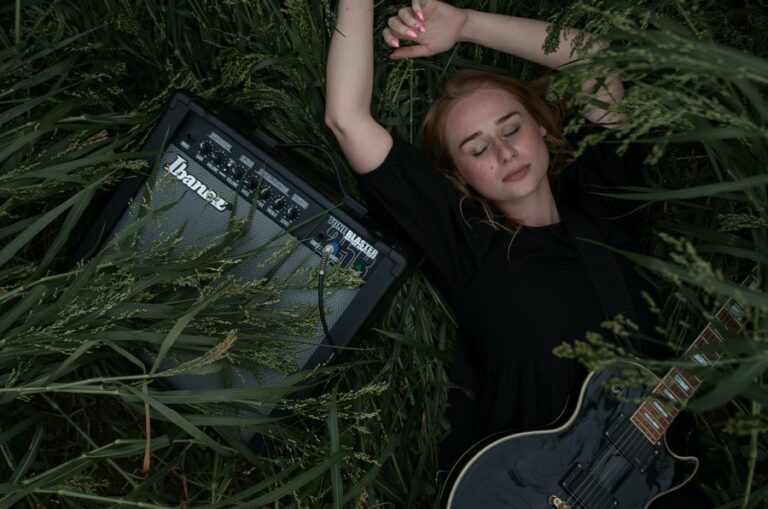There are a lot of circumstances when you would be pressed to use a guitar amp for a bass guitar. For instance, you’re a guitar player who wishes to learn the bass guitar and already have a guitar amp. In this case, you’d be inclined to use your guitar amp and not make an extra investment in a bass amp.
Or, it could be that you do not have access to a bass amp for whatever reason. In such a scenario, you’d wonder if you can play the bass through a guitar amp. Are bass and guitar amp the same? If not, what are the differences?
The short answer:
Yes, a guitar amp does work with bass guitars since they both use the same cable and connectors. However, in most cases, it would be best if you only used them at low volume as a practice amp and never for gig-level volume. Particularly the speakers in the guitar amp are not designed for constant low-frequency output (the bass sound) and can easily be damaged if used at high volume.
The jack you use to plug the guitar or bass is the same in both amps; therefore, you can hook up a bass into a guitar amp without additional equipment. Moreover, the primary amplification circuit is very similar in both the amps.
Read on to know the similarities and differences between these two types of amps and under what circumstances you could use the guitar amp for your bass in a safe manner.
What Are The Differences Between a Guitar Amp and a Bass Amp
First, let us get the differences between the two out of the way so that you can easily follow the precautions and advice which will come later in the article.
Electronic Circuit
The circuit in a guitar amp is designed for a wider-range frequency amplification, especially the mid and upper-frequency range. On the other hand, a bass amp emphasizes the lower range frequency, and the equalizer is also adjusted accordingly.
The low-end frequency that bass can handle could be as low as 20Hz, and the higher end is largely capped at around 2000Hz. Regular guitar amps have a wider frequency range, from around 80Hz to 5000Hz. The higher-end is needed for effects such as distortions and overdrive.
Due to the frequency response differences, it is abundantly clear that bass will not sound the same with a guitar amp as the low-end output will be subdued.
The power output is also very different. A guitar amp is around 50 to 150 watts, while a bass guitar can go as high as 500 watts. The lower frequencies need more speaker recoil and more air to be pushed, which is why a higher power output is required in order to drive them.
Speakers

Speakers in a guitar amp are smaller and have a cone material that is not as sturdy as in the bass amp. The speakers in a guitar amp are designed to reproduce the sound of wider-range frequencies compared to bass amp speakers, which are bigger and more robust in construction.
Sturdier speakers can handle the higher power output of the amplifier needed for the low-end frequencies, which causes more recoil. They also have different frequencies they favor more, like the very low-end. All this makes them produce the tighter thumpy bass sound — the signature of bass guitars.
Therefore, when used with bass, a guitar amp would not only be unable to produce the punchy sound but, if pushed hard at a higher volume, could result in the speakers getting permanently damaged. Even if the speakers do not burn out outright, prolonged exposure to bass frequencies, even at mid-volumes, may deform the speakers, making them incapable of producing decent sound.
How To Use a Bass with Guitar Amp?
As mentioned previously, a guitar amp has the same jack as a bass amp; therefore, you can plug in the guitar to a regular amp just the same. It will not break the amp, and you’ll not need anything special. However, you cannot expect the same sound output from regular guitar amps as they are designed for guitars that are an octave above the bass.
It is also advisable to stay at low volumes to keep the guitar amp safe. The low-end bass will sound much more “thin” on the guitar amp, and as you increase the volume, there will be more distortion in the low end which might damage the speakers.
How is the Sound of a Bass Through a Guitar Amp?
The sound of a bass guitar through a guitar amp will be lacking in the lower end and much stronger in the mid-frequency range. Bass guitars are an octave below regular guitars. Bass amps, similarly, are designed to work with lower-end frequencies. Therefore, it is natural that bass will sound the best with an amp explicitly designed for it.
Guitar amps are made for a broader frequency range; the lowest they can handle is usually much higher than a bass guitar can produce. On top of that, some guitar amps may have a high-pass filter that filters out lower-end frequencies, thus, making the bass sound “thin.”
I am not saying a guitar amp won’t produce any bass — it will, particularly the solid-state ones, just not as impactful. You can also tune the EQ setting in the amp with the treble at the lowest and the bass at the highest (or anything else you prefer) to have decent sound output.
When is it OK to Use a Guitar Amp for Bass Guitar?
We do not live in a perfect world, and there are times when we have to make a compromise. One such compromise is to use a bass with a guitar amp. Let’s look at some of the circumstances when you’re left with no choice but to use a guitar amp for bass:
You’re a Guitar Player
You’re a guitar player and already have a guitar amp, but now you wish to try your hands on a bass. The bass guitar itself is a moderately high-investment instrument, and naturally, you’ll not want to invest in another amp just yet. In this case, by all means, use the guitar amp you have — but follow all the precautions mentioned in this article. There is no need to invest in a bass amp if you’re just trying out the bass guitar.
You’re Practicing
If, for whatever reason, you cannot use a bass amp (it burned out or a friend borrowed it for a gig) and all you need to do is practice in your bedroom, it is alright to use a guitar amp. A guitar amp should sound good enough for practice at lower volumes and with the right EQ settings.
You Can Get a Cheap Amp
If you’re starting with a bass guitar and all you can afford to buy is, maybe, a used guitar amp, then get it. It is much better than practicing a bass without an amp.
Things to Remember When Using a Bass with Guitar Amp
If you don’t push the amp at higher volumes with continued low-end bass frequencies, you’ll not damage your guitar amp in most cases. Let’s look in detail at the do’s and don’ts to keep your guitar amp safe and in good condition.
Play At a Lower Volume
Low volume means a very low (or any) risk of damaging the speakers in the amp. Always keep the volume at a level you can hear comfortably in your practice room and go no further than that. Use the EQ settings to get the best possible sound at that level.
You can sometimes go a little higher, which is when you’ll start to notice distortions in the sound and some rattling when playing the low notes. It is not advisable to play continually at this volume (especially the lower-end notes). Go beyond this volume, and you risk permanently damaging your speakers.
Play Without Effects
Bass players generally do not use many effects, but if you’re someone who does, it is advisable to refrain from using them while plugged onto a guitar amp.
Some distortion may be alright, but continuously blasting bass frequencies with distortion and other effects, especially at higher volumes, will be too much to handle for the smaller speakers in a guitar amp. You risk disfiguring the speakers’ cone in a way they would never sound the same even though the speakers themselves do not outright burn out.
Be Extra Careful with Active Bass Guitars
Active bass guitars have an inbuilt battery-powered pre-amp that lets you make more adjustments to the signal being sent to the amp. They may have an EQ that allows you to fine-tune specific frequency range and volume control to set the signal gain.
If set very high, the volume control may damage the guitar amp as the input signal is too high to handle. Or, in the best case, cause a lot of harsh rattling sound, which is unpleasant to hear. In order to be safe playing an active bass, it is advisable to either set the onboard volume setting low or use a pedal that reduces the signal to a safe level for the guitar amp.
A passive bass doesn’t have a signal booster circuit and is, therefore, safer when used with a guitar amp.
It is Not a Gigging Amp
Practicing is OK but never use a guitar amp with bass on a gig level since the volume required will almost certainly cause damage to the amp and its speakers. And, don’t let your bassist friend borrow your guitar amp for a gig, either!
Different Types of Amps And Whether to Use them With Bass
There are several types of guitar amps. The common one is a solid-state amp that uses electronic components like ICs, transistors, etc., while tube amps use older technologies like vacuum tubes. Some people prefer the sound of tube amps which is why they are still popular and relevant.
Solid-State Amps

These are the most common type of amps using solid-state electronic components. These amps are generally economical, lighter, sturdier, and can take some abuse. The flip side is that compared to the more expensive tube amps (discussed below), some people find the sound of solid-state amps dull.
As far as we are concerned, it is safe to connect a bass with a solid-state amp, unless it is Roland JC-120 (which costs north of $1000)!
Tube or Valve Amp

Tube amps use vacuum tubes for amplification, unlike solid-state amps. These amps are bulkier, fragile, and more expensive, but some people like the warm tone that they can produce.
The vacuum tubes, which consist of delicate glass tubes, need to be replaced after some time as a part of maintenance, and the replacements are not cheap. Playing low frequencies (from the bass) for which the tubes weren’t designed will increase the chances of requiring a replacement sooner. Thus, it is widely acknowledged, and we’ll say the same: playing bass with tube amps is not a good idea under any circumstance.
Do You Absolutely Need to Buy a Bass Amp for Bass Guitar?
Today’s solid-state guitar amps are more than capable of handling a bass guitar signal without suffering any damage if played at lower volumes. So, the answer is — no, you don’t necessarily need to buy a bass amp.
However, you certainly cannot expect the specialized sound that bass amps can produce from a guitar amp. This is fine as long as you’re a guitar player and just starting, or all you have access to is a guitar amp. Just remember the points discussed here and exercise common sense.
However, if you’re passionate about bass guitars and want to do serious practice, you should consider investing in a bass amp. The sound quality will be much better than a guitar amp with a cleaner, and more thumpy low-end, which, being the signature of a bass guitar, will make the practice much more enjoyable.


